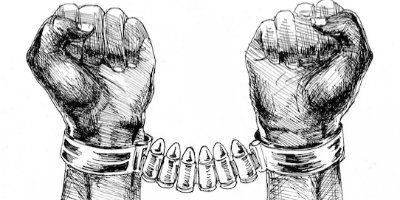jul 23, 2003 - Associated Press report abuses at Abu Ghraib
Description:
In June 2003, Amnesty International published reports of human rights abuse by the U.S. military and its coalition partners at detention centers and prisons in Iraq. These included reports of brutal treatment at Abu Ghraib prison, which had once been used by the government of Saddam Hussein, and had been taken over by the United States after the invasion.On July 23, 2003, Amnesty International issued a press release condemning widespread human rights abuses by U.S. and coalition forces. The release stated that prisoners had been exposed to extreme heat, not provided clothing, and forced to use open trenches for toilets. They had also been tortured, with the methods including denial of sleep for extended periods, exposure to bright lights and loud music, and being restrained in uncomfortable positions.
On November 1, 2003, the Associated Press presented a special report on the massive human rights abuses at Abu Ghraib. Their report began; "In Iraq's American detention camps, forbidden talk can earn a prisoner hours bound and stretched out in the sun, and detainees swinging tent poles rise up regularly against their jailers, according to recently released Iraqis." The report went on to describe abuse of the prisoners at the hands of their American captors: "'They confined us like sheep,' the newly freed Saad Naif, 38, said of the Americans. 'They hit people. They humiliated people.'" In response, U.S. Brigadier-General Janis Karpinski, at the time in charge of all U.S. detention facilities in Iraq, claimed that prisoners were being treated "humanely and fairly."
Since the beginning of the invasion, the International Committee of the Red Cross (ICRC) had been allowed to oversee the prison, and submitted reports about the treatment of the prisoners. In response to an ICRC report, Brigadier General Janis Karpinski, who oversaw all US detention facilities in Iraq, stated that several of the prisoners were intelligence assets, and therefore not entitled to complete protection under the Geneva Conventions. The ICRC reports led to Lieutenant General Ricardo Sanchez, the commander of the Iraqi task force, appointing Major General Antonio Taguba to investigate the allegations on 1 January 2004. Taguba submitted his findings (the Taguba Report) in February 2004, stating that "numerous incidents of sadistic, blatant, and wanton criminal abuses were inflicted on several detainees. This systemic and illegal abuse of detainees was intentionally perpetrated by several members of the military police guard force." The report stated that there was widespread evidence of this abuse, including photographic evidence. The report was not released publicly.
Manadel al-Jamadi, a prisoner at Abu Ghraib prison, died after a CIA officer Mark Swanner and a private contractor ("identified in military-court papers only as 'Clint C.'") interrogated and tortured him in November 2003. The torture included physical violence and strappado hanging, wherein the victim is hung from the wrists with their hands tied behind their back. Although the US military labeled the death a homicide, neither of the two men who caused his death were charged. The private contractor was granted qualified immunity.
In 2004, Antonio Taguba, a major general in the U.S. Army, wrote in the Taguba Report that a detainee had been sodomized with "a chemical light and perhaps a broomstick." In 2009, Taguba stated that there was photographic evidence of rape having occurred at Abu Ghraib. An Abu Ghraib detainee told investigators that he heard an Iraqi teenage boy screaming, and saw an Army translator raping him, while a female soldier took pictures.
In other instances of sexual abuse, soldiers were found to have raped female inmates, and senior U.S. officials admitted that rape had taken place at Abu Ghraib. Some of the women who had been raped became pregnant, and in some cases, were later killed by their family members in what were thought to be instances of honor killing. In addition, according to Seymour Hersh video exists which shows that children were raped by prison staff in front of watching women.
The scandal came to widespread public attention In April 2004, when a 60 Minutes II news report was aired on April 28 by CBS News, describing the abuse, including pictures showing military personnel taunting naked prisoners. An article was published by Seymour M. Hersh in The New Yorker magazine (posted online on April 30 and published days later in the May 10 issue), which also had a widespread impact. The photographs were subsequently reproduced in the press across the world. The details of the Taguba report were made public in May 2004. Shortly afterwards, U.S. President George W. Bush stated that the individuals responsible would be "brought to justice," while United Nations General Secretary Kofi Annan said that the effort to reconstruct a government in Iraq had been badly damaged.
Added to timeline:
Date:
jul 23, 2003
Now
~ 22 years ago
